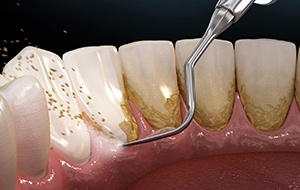Periodontal Treatment – Jacksonville, FL
How We Protect Your Entire Smile
Gums that bleed easily, reddened gums around the teeth, tenderness to touch and brushing, persistent bad breath, receding gums, and teeth that appear longer than they once did are all signs of gum disease. The Center for Disease Control states that nearly half of Americans have gum disease. At North Jacksonville Complete Dentistry, we are aware of these facts and are dedicated to taking a stand against gum disease. If you have any of these signs and symptoms, we encourage you to read on or contact us at any time. Often it is only after you understand this disease that you understand the importance of periodontal treatment.
Why Choose North Jacksonville Complete Dentistry for Periodontal Therapy?
- Gum screenings at every appointment
- Deep cleanings remove infection at the source
- Fast, precise, & comfortable treatment with a soft tissue laser
What is Gum Disease?

To simplify things, gum disease presents in two major categories. First, gingivitis is an inflammation of the gums. The good news is that gingivitis is reversible. Generally a professional cleaning followed by a few changes in habits can lead to optimal oral health. Gingivitis often goes untreated and can progress to periodontitis.
To understand periodontitis, it is important to understand what causes gingivitis. Our mouths house a complex community of proteins, carbohydrates, and bacteria. Much of this is beneficial but much is not. Plaque is this community's soft buildup that occurs on tooth surfaces. When plaque is not properly removed, it begins to mineralize and harden. The body sees this as foreign and fights back. This is a losing battle. The result is an immune response that is gingivitis.
When left unchecked, this chronic immune response begins to target the bone that secures the teeth as well as the ligament that holds the tooth in the bone. The result is an irreversible loss of some of the jawbone.
Why "Management" and not "Treatment"?

The word management was not used accidentally. When we use the word "treat", it implies to most that we are eliminating the problem. Gum disease is not treated, it is managed. Often the immune system responds more aggressively each time it is exposed to an irritant. This means that regular exams and regular maintenance with your hygienist are crucial to prevent this loss of the jawbone structure.
How is Gum Disease Managed?
Gum disease management begins with an examination of the bone, gums, and teeth. Your dentist and hygienist will determine the severity and develop a treatment plan accordingly. Often the first step is a deep cleaning. This consists of a removal of the buildup which allows the body to begin healing. At a future visit, a re-evaluation of the tissues will occur. Often other therapies will be required such as a special laser to get down into deep pockets and eliminate bacteria.
Scaling and Root Planing

Scaling and root planing in Jacksonville is essentially a deep cleaning of the mouth. It is one of the most common ways to address gum disease, and it can often help patients avoid the need for more invasive procedures, such as gum surgery and tissue grafts. Depending on the extent of a patient’s gum disease, this procedure may take one or more appointments. After it is complete, the gums will have an easier time healing and reattaching firmly to the tooth roots.
What Is Scaling and Root Planing?

As its name implies, scaling and root planing is a two-part procedure. During the scaling portion of this gum disease treatment in Jacksonville, a dentist or hygienist uses special tools to remove plaque and tartar from the teeth. This is similar to what happens during a routine dental cleaning. However, scaling is more intense because it involves cleaning both above and below the gumline.
Once the teeth are clean, we move onto the root planing portion of the procedure. This involves smoothing out the roots of the teeth so it is more difficult for bacteria to cling to them.
Following scaling and root planing, the gums will have the opportunity to firmly reattach to the teeth and begin to heal.
What Can I Expect During and After the Procedure?

One of the first things we do during a scaling and root planing appointment is make sure that our patient is comfortable. Usually, this involves using local anesthesia to numb the portions of the mouth where we will be working. The numbing agent will prevent you from feeling pain, but you will still be able to feel pressure, so you can expect to experience some sensation while we are working. Depending on the extent of your condition, we may need to break up your scaling and root planing across two or more appointments.
After the procedure, you may experience some gum soreness and dental sensitivity for several days. These symptoms tend to dissipate as the mouth heals.
Our team will want to monitor your recovery from gum disease, so be sure to attend all recommended follow-up appointments. We want to help you continue to manage your condition so it does not recur and lead to serious oral health damage.
Do I Need Scaling and Root Planing?

If you are experiencing symptoms of gum disease, such as swollen and red gums, contact us to request an appointment. After we examine your mouth, we can determine whether scaling and root planing is right for you.
If your condition is mild enough, we might be able to address it with simple changes to your oral hygiene routine. However, if it appears that the disease is posing an imminent threat to your smile, scaling and root planing is often the best course of action. In cases where gum disease is particularly severe, we may have to pursue more aggressive treatments than scaling and root planing.
We're Ready to Help

The good news about gum disease is that when caught early, it can be managed and teeth and bone can be preserved. Dr. Bradberry, Dr. Baxter, and our hygiene team will do our best to provide the necessary treatment and education to allow for optimal periodontal health for years to come!
